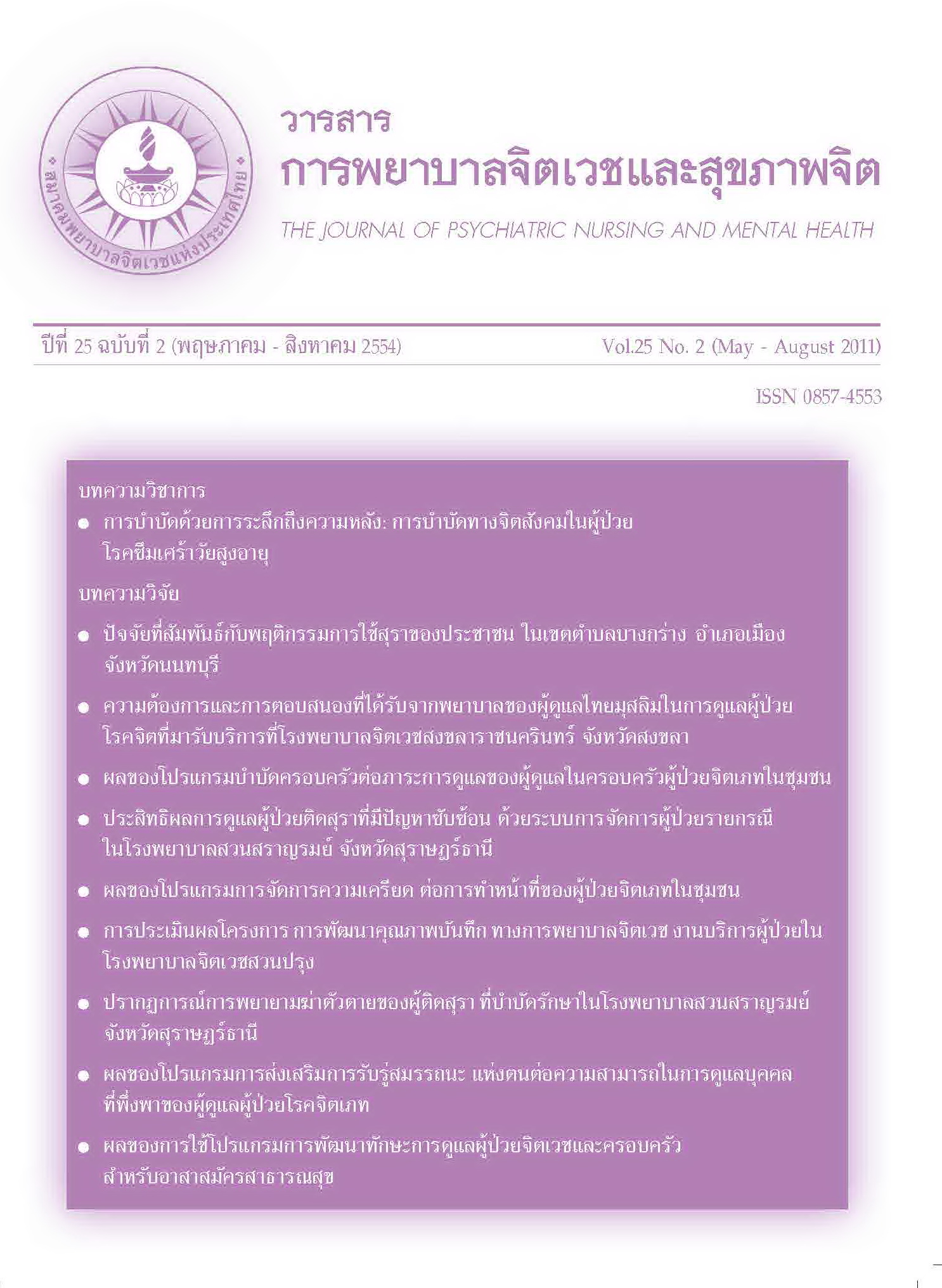ผลของโปรแกรมการจัดการความเครียดต่อการทำหน้าที่ของผู้ป่วยจิตเภทในชุมชน
Main Article Content
บทคัดย่อ
บทคัดย่อ
การศึกษาครั้งนี้ มีวัตถุประสงค์ คือ 1) เพื่อเปรียบเทียบการทำหน้าที่ของผู้ป่วยจิตเภทในชุมชนก่อนและหลังได้รับโปรแกรมการจัดการความเครียด 2) เพื่อเปรียบเทียบการทำหน้าที่ ของผู้ป่วยจิตเภทในชุมชนระหว่างกลุ่มที่ได้รับโปรแกรมการจัดการความเครียดกับกลุ่มที่ได้รับการดูแลตามปกติ กลุ่มตัวอย่างคือ ผู้ป่วยจิตเภทในชุมชนที่ได้รับการรักษาในแผนกผู้ป่วยนอก โรงพยาบาลศูนย์ราชบุรี ซึ่งมีคุณสมบัติตามเกณฑ์ จำนวน 40 คน และได้รับการจับคู่แล้วสุ่มเข้ากลุ่มทดลอง และ กลุ่มควบคุมกลุ่มละ 20 คน กลุ่มทดลองได้รับการดูแลตามโปรแกรมการจัดการความเครียดที่ผู้วิจัยสร้างขึ้น ประกอบด้วยการดำเนินกลุ่ม 7 ครั้ง เพื่อพัฒนาทักษะที่เกี่ยวข้อง ได้แก่ การผ่อนคลาย การรับประทานยา การจัดการกับอาการทางจิต การเสริมสร้างความเข้มแข็งของร่างกาย การบริหารเงินและเวลา การสื่อสาร และ การเผชิญกับการรับรู้ตราบาป ส่วนกลุ่มควบคุมได้รับการดูแลตามปกติ เครื่องมือ ที่ใช้ในการวิจัย คือ 1) โปรแกรมการจัดการความเครียด 2) แบบวัดทักษะชีวิต และ 3) แบบวัดการรับรู้ความเครียด ซึ่งผ่านการตรวจสอบความตรงเชิงเนื้อหาจากผู้ทรงคุณวุฒิ จำนวน 5 ท่าน โดยเครื่องมือสองชุดหลัง มีค่าความเที่ยงสัมประสิทธิ์อัลฟาของครอนบาคเท่ากับ 0.93 และ 0.81 ตามลำดับ
ผลการวิจัยสรุปได้ดังนี้ 1. การทำหน้าที่ของผู้ป่วยจิตเภทในชุมชน หลังได้รับโปรแกรมการจัดการความเครียดสูงกว่าก่อนได้รับโปรแกรม การจัดการความเครียดอย่างมีนัยสำคัญทางสถิติที่ระดับ 0.05 2. การทำหน้าที่ของผู้ป่วยจิตเภทในชุมชน กลุ่มที่ได้รับโปรแกรมการจัดการความเครียดสูงกว่ากลุ่มที่ได้รับการดูแลตามปกติอย่างมีนัยสำคัญทางสถิติที่ระดับ 0.05
คำสำคัญ : ผู้ป่วยจิตเภท, การทำหน้าที่, ชุมชน, โปรแกรมการจัดการความเครียด
Abstract
The purpose of this quasi-experimental research using the pretest-posttest design wer: 1) to compare the functioning of schizophrenic patients in community before and after received the stress management program, and 2) to compare the functioning of schizophrenic patients in community who received stress management program and those who received regular caring activities. Forty of schizophrenic patients receiving services in outpatient department, Ratchaburi Central Hospital, who met the inclusion criteria, were matched pair and then randomly assigned to experimental group and control group, 20 subjects in each group. The experimental group received the stress management program composed of 7 group activities to improve relevant skills including relaxation, medication and symptoms management, physical strength, budget and time management, communication, and dealing with stigma. The control group received regular caring activities. Research instruments were: 1) the stress management program, 2) The Life Skills Profile, and 3) The Perceived Stress Scale. All instruments were validated for content validity by 5 professional experts. The Chronbach’s Alpha coefficient reliability of the two latter instruments were 0.93 and 0.81, respectively. The t-test was used in data analysis. Major findings were as follows:
1. The functioning of schizophrenic patients in community who received the stress management program was significantly better than that before, at p 0.05 level.
2. The functioning of schizophrenic patients in community who received the stress management program was significantly better than those who received regular caring activities at p 0.05 level.
Keywords : Schizophrenic patients, Functioning, community, stress management program
Article Details
บทความที่ได้รับการตีพิมพ์แล้ว เป็นลิขสิทธิ์ของสมาคมพยาบาลจิตเวชแห่งประเทศไทย


